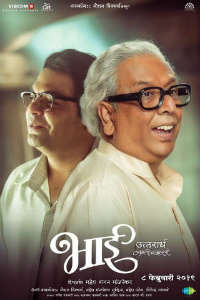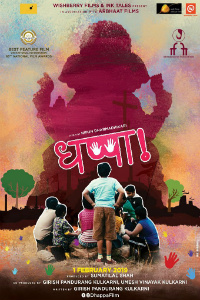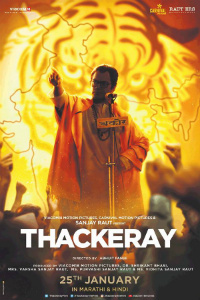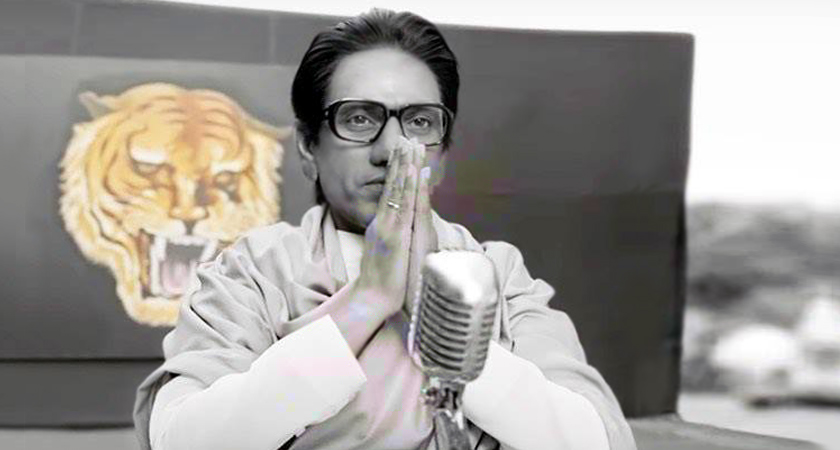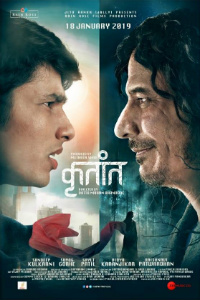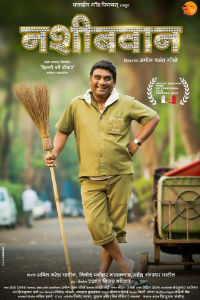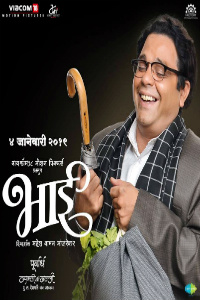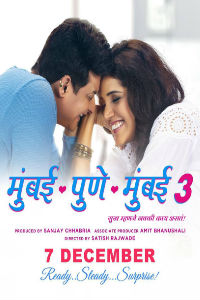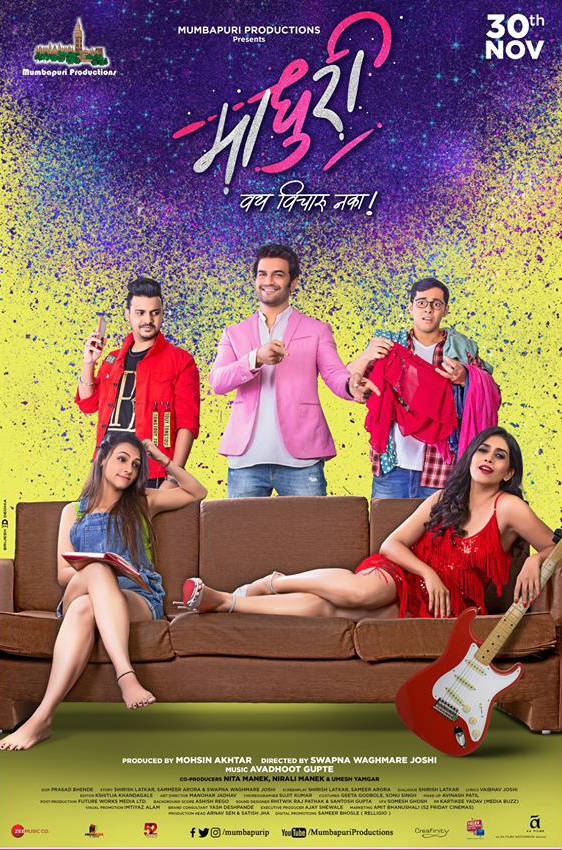‘Anandi Gopal’ – a truly inspiring realistic biopic with a social message
4.0
User Rating
( vote)
|
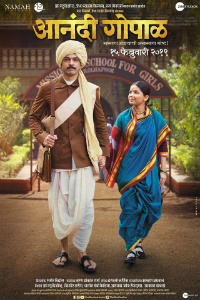 |
|
Anandibai Gopalrao Joshi was one of the earliest Indian woman physicians in the 19th century, when India was under British rule. She was the first woman who graduated with a two-year degree in western medicine in the United States. Now, a biopic on her has been presented through latest released Marathi film ‘Anandi Gopal’. Anandibai as she was addressed by the American Medical College during the convocation, lived a very short life of 22 years. But, she inspired many young Indian women to pursue higher studies, at a time when the male dominant society did not permit their daughters to pursue higher studies . Anandi made it possible, only because of the encouragement from her husband Gopalrao, who was a reformer and served in the postal department.
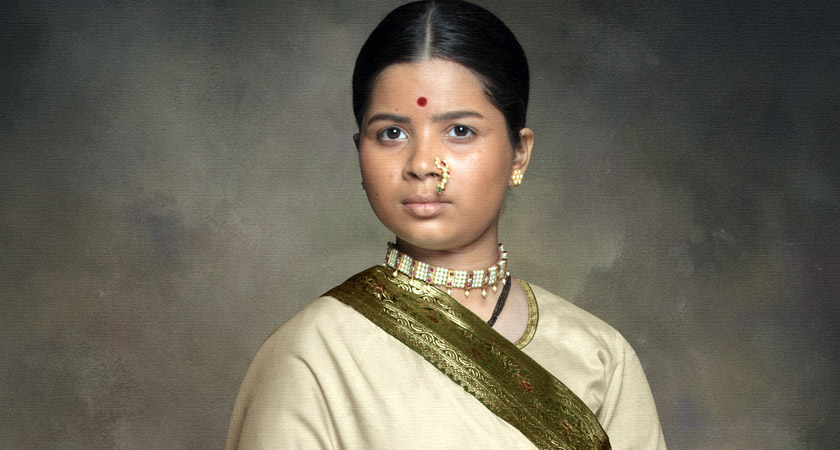
The film ‘Anandi Gopal’ directed by Sameer Vidwans presents Bhagyashree Milind & Lalit Prabhakar in title roles. Though the film is based on a real story, the manner in which the screenplay and dialogues have been written, it does create a strong impact on the audience. The hurdles faced by Gopalrao from his hometown, while educating his younger wife, clearly shows how women were treated during 19th century. The film covers the period around 1880, when Yamuna who turns Anandi after her marriage to a widower Gopalrao, who believes in offering education to women.
In spite of facing the opposition from the neighbourhood and his own community, Gopalrao first sends his wife to a Christian missionary school. But, when she faces trouble there too, he decides to send her abroad for higher education. After cleverly showing the strengths of these two lead characters in the first half of the film, very systematically director Sameer Vidwans has presented the sequence of events in the second half to show Anandi’s impressive success story. There are many emotion filled scenes which touch the heart of the audience. Moreover, few important scenes are also likely to appeal the universal audience and therefore the film certainly stands a chance to find its entry from India for the prestigious Oscars.
The technical departments makes it presentable giving a realistic look to this period film, with superb cinematography by Akash Agarwal & Apoorva Shaligram. Certainly a worth watch film for all sensible film lovers.
‘Bhaai – Part 2′ offers more interesting happenings in legend’s life
Last month we saw very good response received by the film ‘Bhaai – Vyakti Ki Valli’ a biopic on Maharashtra’s beloved personality late P. L. Deshpande. Now, ‘Bhaai – Vyakti Ki Valli- Uttarardha’ (Bhaai – Part 2) which covers more events which had taken place in the later part of the life of legendary writer- actor- director, has been released along with seven other Marathi films this week. But, this film stands tall, because it goes on to show more interesting happenings in the life of ‘Pu La’ while interacting with many more prominent personalities of Maharashtra. In this second part, we find the second innings of P. L. Deshpande and hence we find Sagar Deshmukh and Irawati Harshe Maydeo shown in their 50+ age with more communication happening between them.
The characters of Bhimsen Joshi, Vasantrao Deshpande, Hirabai along with P.L find more scope sharing their company with Kumar Gandharva ( Played by Swanand Kirkire) during his last days. The classical songs rendered by the trio to make happy their ailing friend is a real treat for music lovers. ‘Bhaai – Part 2′ fails to appeal in the first half but takes off well in the second half with lots of happenings which appeal the audience.
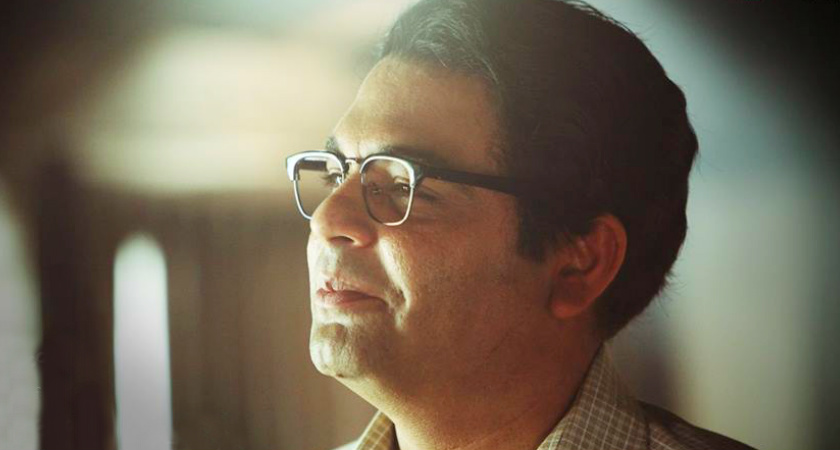
The scenes presenting Pu.La’s involvement in social work have been cleverly shown with his involvement through financial help to Dr. Anil Avchat’s ‘Muktangan- a rehab centre for those addicted to excessive smoking and drinking and also in Baba Amte’s Anandvan centre for rehabilitation and empowerment of people suffering from leprosy. His popular song ‘Nach Re mora…’ in the company of little children from Anandvan has been picturised very well.
The film has also shown the straight forward views expressed by Pu La on the functioning style of politicians of his time. The controversy arising after ‘Pu La’s critical speech read out by his wife while he was conferred with a prestigious award in presence of then Maharashtra C.M. Manohar Joshi, is also part of this film. There is also another scene where he warns Janata Party’s newly elected MP( Portrayed by Bharat Ganeshpure) shows his fearless nature.
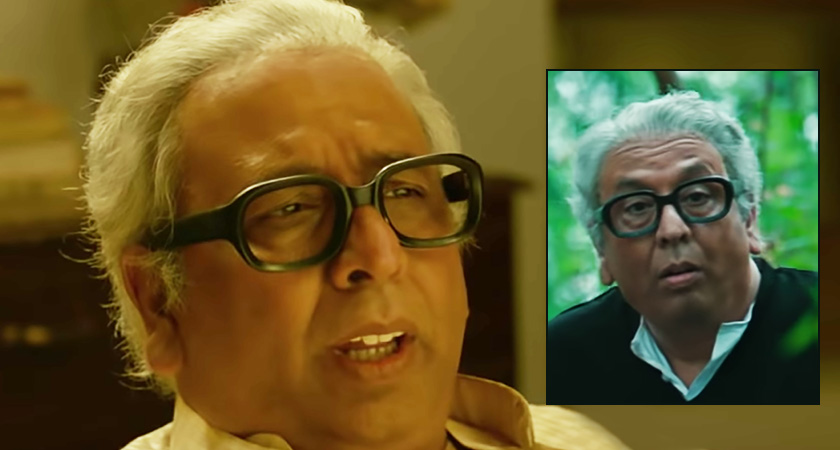
To generate some humour the film also presents Girish Kulkarni as Barkya a childhood neighbourhood friend of PU La, who meets him coincidentally, revealing his present identity. There is also a humour filled scene showing Pu La directing Satish Dubhashi and Bhakti Barve during rehearsals of his super hit play ‘Tee Phulrani’. Actress Pooja Sawant makes a surprise appearance as Jaymala Shiledar in a scene while presenting a classical play. In the same scene we witness sarcastic remarks made by the character of Vijay Tendulkar about this play.
Not to forget the best performances by all the artistes. The only drawback of this Part 2 is for not presenting the screenplay in first half that well as compared to second half. But, certainly a worth watch film for all those admirers of Pu La the great.
‘Dhappa’ highlights importance of national integration through entertainment
Today’s children will be responsible citizens of tomorrow. And therefore their proper grooming is very important. Besides learning the right things from school it is necessary for the children to find good company in the neighborhood to socialize in a right manner. For this, they need to take active part in extra curricular activities, instead of getting addicted to mobiles and computer games. Writer Girish Kulkarni who is also producer of new Marathi film ‘Dhappa‘ with the help of director Nipun Dharmadhikari has offered a sensible film on this subject, which revolves around a group of children living in a housing society in the city of Pune.
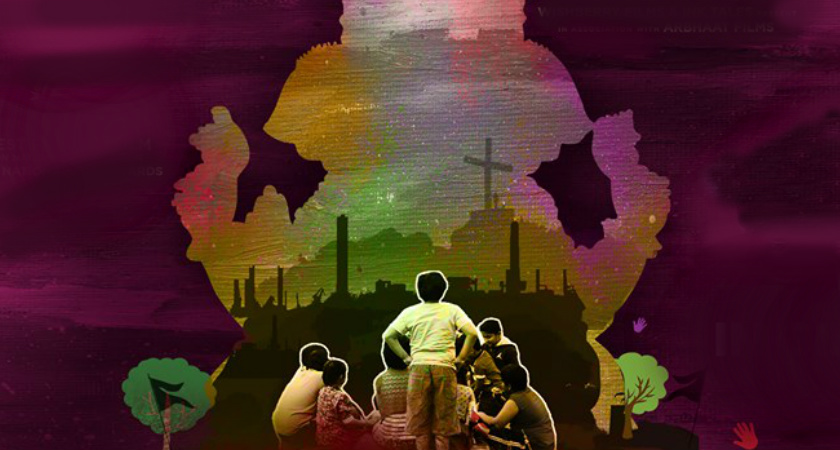
Though some of the children are mischievous and are involved in their regular fights over petty issues, they have strong bonding developed among them, with the efforts taken by one of the resident Anuradha Deodhar (Vrushali Kulkarni) whose little daughter is also part of this group of children. The children call her Anuradha tai . There are also two mature children namely Surhud (Aakash Kamble) who is suffering from neuromuscular disease and Sharvi ( Sharvi Kulkarni) who sorts out all their problems and keeps them together. Surhud who rides an automatic wheel chair is respected by the children and is addressed by them as Hawkya( Short name of Well Known British Physicist Stephen Hawking).
The story of this film begins when Anu tai plans to present a play of these children based on human evolution and environment during the community Ganapati festival and they begin their planning. Initially, some children are reluctant to perform because of the subject instead of their favourite mythology. But, the creative Anu tai with the help of Surhud and Sharvi incorporate such characters to make it more interesting from their point of view but without changing the theme. When the news about their play reaches the leader of a political party of their area through one of the residents, he with the help of his goons threatens Anu tai and the children, to keep away from performing this play. How these children face this challenge and how they unite to show their strength is what the second part of this 1 hour 55 minute long film is all about.
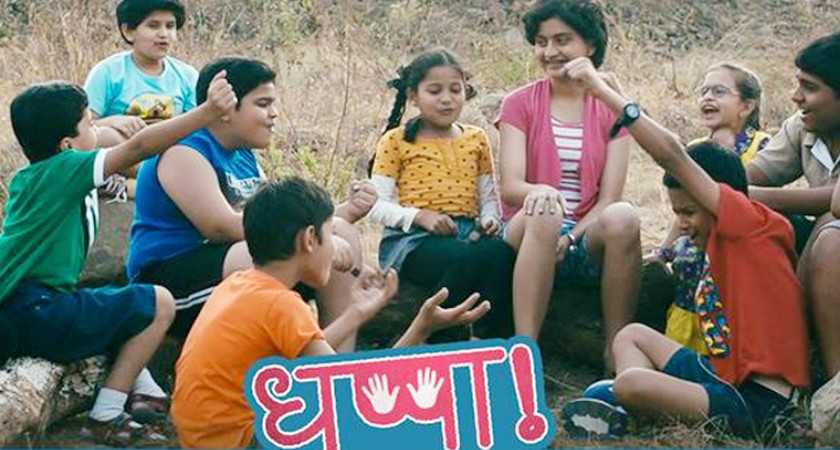
Writer Girish Kulkarni and director Nipun Dharmadhikari have really worked hard to counter the existing social terrorism which comes in the way of National Integration. Very cleverly they have selected little children to convey this timely message to the society in an entertaining way. Watch the code language used by the children while communicating among themselves to maintain secrecy, which is the best part of the film. Every scene in this film is well planned and the entire team seems to have worked hard in its management. Also each and every character has a special significance in the screenplay, including the children of society watchman who are treated on par with other children by sensible society residents. The inclusion of characters like Soman kaka( Chandrakant Kale) and Mohite Aaji ( Jyoti Subhash) generate a lot of humour with their presence through few scenes.
Besides the group of talented children, there are few other versatile artistes like Sunil Barve, Irawati Harshe, Shrikant Yadav, Umesh Jagtap, Chhaya Kadam, Girish Kulkarni and others, who have contributed sincerely towards an excellent presentation of this timely subject. Suitable Music by Gandhaar, fine cinematography by Swapnil Sonavane and apt editing by Suchitra Sathe are the other plus points of this creative film. Don’t look at this film as a children’s film. All in all It is a worth watch film for all.
‘Thackeray’ film presents the strong influence of charismatic Balasaheb
Balasaheb Thackeray was the most powerful and charismatic leader in Maharashtra who controlled his political party Shiv Sena in such a way that the party was voted to power not only in Mumbai Municipal Corporation but also during the Assembly elections. Under his leadership the party also won Parliamentary elections in most parts of Maharashtra, this spreading its strength at National level. But, the young generation is not aware of Balasaheb’s entry into politics during his younger days, when as a Cartoonist he worked in Free Press Journal as a cartoonist.
In the biopic ‘Thackeray’ released on Friday 25th January, we find the legend’s journey right from the days, when he launched his own weekly ‘Marmik’ in early 60s . Well, everybody knows that the popularity of this weekly and the hard hitting views in the interest of local people expressed by him as a firebrand journalist, influenced the people from Maharashtra. In the film we find all these happenings but interestingly the story of birth and evolution of Shiv Sena has been clearly shown how a Congress CM saw the end of rising pressure of Leftists by indirectly supporting Shiv Sena.
Actually, the film covers the journey of Balasaheb’s rising popularity from early 60s till 1994 when he was questioned in the court about his role in Ayodhya dispute. And therefore, we find his interactions with many political leaders right from Mr. Y.B. Chavan, who was then CM of Maharashtra during early 60s, followed by his successor Vasantrao Naik, PM Indira Gandhi and many others. His style of functioning and his trust in his close associates has been clearly shown through many important scenes. Hence we find the characters of his trusted leaders like Datta Nalawade, Wamanrao Mahadik, Dattaji Salvi, Manohar Joshi and few others getting importance in the film. At the same time, we find his friendly relations with his political rivals Mr. Sharad Pawar and George Fernandes. However, characters of important leaders who were earlier close to him and later ditched him, have been conveniently avoided in this film. Instead the film presents the strong influence of charismatic Balasaheb, taking right decisions at the right time and standing by his words.

Writer Sanjay Raut and director Abhijit Panse have accordingly paid more attention on his body language, style of delivering his speeches and his belief in himself and his soldiers whom he addressed as Sainiks. This has offered better scope to Nawazuddin Siddiqui to show his skills and he has done full justice to his role. Amrita Rao in the role of his wife Meena Tai Thackeray suits very well in that character . Many versatile artistes offer excellent support through their respective character roles, though they have limited scope. Music by team of Amar Mohile, Rohan-Rohan, Sandeep Shirodkar goes well with the film’s screenplay. Cinematography by Sudeep Chatterjee is also impressive. Though at some places in the screenplay, it gives a look of a documentary, all in all it is a well presented film.
‘Krutant’ defines destiny in a philosophical manner
You never know what will happen in your life in future. Many a times this change is controlled by some force. And you call it ‘Destiny’. Latest released Marathi film ‘Krutant‘ is based on this philosophy. Samyak ( Suyog Gorhe) and Reva( Sayli Patil) are happily married couple who live in Mumbai . Samyak who is workaholic does not find enough time for his wife, mother and little child. But, his lenient wife tries to adjust herself with his busy lifestyle.
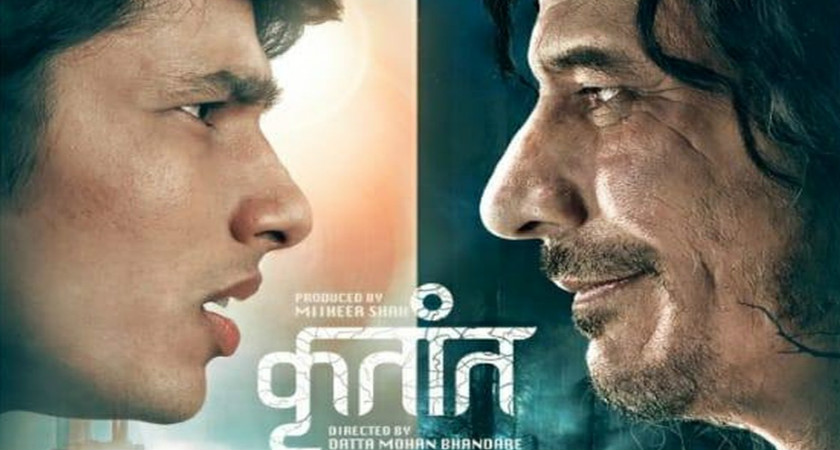
One day his old college friends, who are also family friends request Samyak to join for a picnic at one of his friend’s native place, which is 6 hours away from Mumbai. After persuasion Samyak agrees to join them for two days, with a condition that he would join them directly at the picnic destination. Reva suggests Samyak to travel by Tourist bus instead of driving himself all the way. Samyak reaches the place, but finds none of his friends to pick him up. On calling them, he is suggested to hire a tumtum( tempo type rickshaw) , which drops him at a spot from where he has to walk down to the village. Soon, it gets dark and it starts raining. There is no sign of his friends. Helpless, he takes shelter in a shanty owned by a stranger ( Sandeep Kulkarni) who tells him that he attends to puncture work of tyres. Initially, reluctant to communicate with him, thinking that he is a beggar, Samyak soon realises that this stranger has a lot of knowledge and talks sense on the topics like loneliness, change and destiny in a philosophical manner. He then patiently listens to his past, when the stranger narrates his story.
It is this interesting story that brings a twist in the film’s screenplay and the audience too get engrossed into it. Writer- Director Datta Bhandare has very cleverly developed this plot, with the help of excellent cinematography by Vijay Mishra, good background music by Vijay Gavande and superb sound design. Performances of lead artistes are good , especially from Sandeep Kulkarni who makes his comeback through this film and dashing Suyog Gorhe. Charming Sayli Patil has very little to do in this film, but she has played her part well. Good support comes from other character artistes. However few doubts remain unanswered in the screenplay. But, the attempt to handle such a mystery based story is good. All in all, ‘Krutant‘ film takes you on a different journey.
‘Nashibvaan’ exposes the attitude of people after acquiring quick money
Majority of people living in our country are not able to meet their daily requirements due to shortage of their earnings. Due to heavy borrowings, they are always in a dilemma to repay their loans. However, most of them live on some hope that one day destiny would change their lives. Latest released Marathi film ‘Nashibvaan’ revolves around the family of one such lower middle class person Baban (Bhalchandra Kadam) , who works as a sweeper in Municipal Corporation. Baban lives in a small room in a chawl and somehow manages the day to day requirements of the family, with his wife ( Mitalee Jagtap) who also supports him with some additional earnings by working as a domestic help. The film is based on original story ‘Dilli Ki Deewar’ written by Uday Prakash.
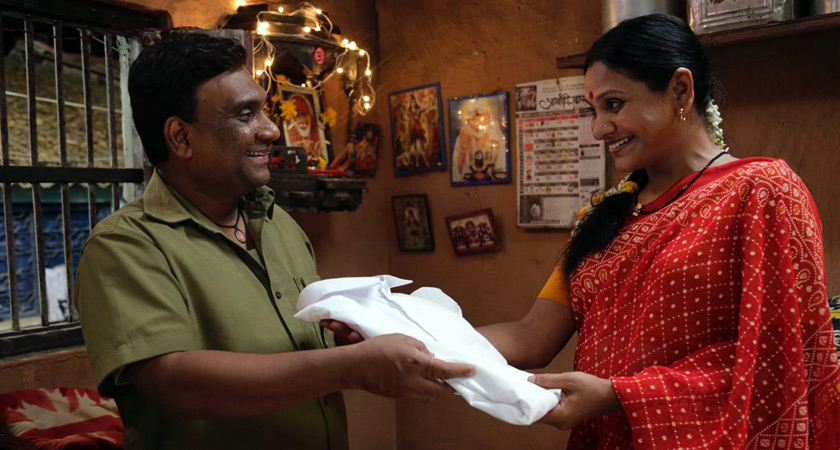
One day, after completing his duty, Baban is offered some extra work against payment by a Jewellery shop owner, who asks him to clean up the adjacent narrow duct next to his shop. While cleaning the huge debris, Baban hits the Bamboo stick of his broom on the side wall in frustration and few bricks are broken. When Baban peeps inside he notices bundles of high denomination currency notes. He removes few bundles and makes his exit from there after covering the broken portion with the bricks. How, he manages to take away more money from this duct and how his life changes, has been very systematically shown by screenplay writer & director Amol Vasant Gole. In this process, the director has paid more attention on the attitude of different characters, such as Baban, his wife, his female colleague at workplace (Neha Joshi) towards whom Baban has a soft corner and the Police officer.
The screenplay of this film moves very effectively generating a lot of interest, almost on the lines of World Cinema. But, in the post interval stage, the film fails to hold this grip, with few scenes which are not convincing. However, the concluding part gives a surprise to the audience. Overall, this fiction based film has been handled well by cinematographer – director Amol Gole. Performances are very natural by the lead artistes comprising of Bhalchandra Kadam, Mitalee Jagtap , Neha Joshi with good support coming from Rajesh Shringarpure, Yatin Karyekar, Tejpal Wagh and others. Music by Soham Pathak is just fine. This is not a comedy film, but surely a story based film generating some spontaneous humour, which arises out of some dialogues uttered by Bhau Kadam at different situations.
‘Bhai – Vyakti Ki Valli’ – is a perfect tribute to legendary ‘Pu.La.’
There is hardly any family in Maharashtra which does not know the name of Purushottam Laxman Deshpande, popularly known by his initials ‘Pu. La.’ A multifaceted personality that he was, ‘Pu. La.’ was a renowned Marathi writer and humorist from Maharashtra. He was also an accomplished film and stage actor, besides being a script writer, author, composer & musician (as he played the harmonium very well). But, above all, he was a good singer and orator. In short, he was referred to as “Maharashtra’s beloved personality”. This year being his birth centenary, a biopic ‘Bhai – Vyakti Ki Valli‘ has been presented by film maker Mahesh Manjrekar and the same is being released in theatres from Friday 4th January 2019.
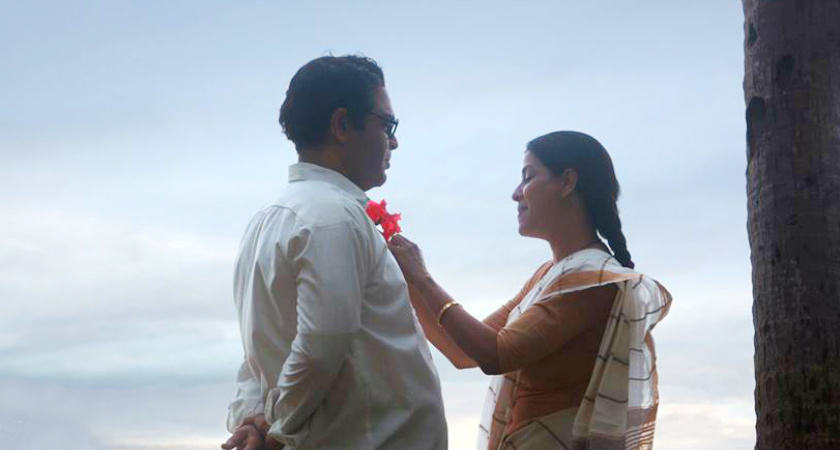
‘Pu.La.’ passed away in the year 2000 at the age of 81 and Maharashtra lost a legend. However, he is still remembered by his admirers and a biopic on him has turned out to be a biggest tribute to this legendary personality. The film which has been released in Part I, (with second part to be followed next month) presents the important happenings in the life of this legend, right from his childhood, including his marriage and achieving success thereafter. Director Mahesh Manjrekar shows his last stage, when he moves into Coma in Pune hospital and then we see all the happenings in his life in flashback, with his wife Sunita going down memory lane, remembering the golden moments in their life.
The research work of this film has been done very systematically, not missing anyone, whoever came closer into his life. One more interesting fact shown in this film was during his stint when he served as a teacher and where he met his wife Sunita also a teacher in Orient High School, Mumbai. It was at this place he met Bal Thackeray as a student and spotted his skills in caricature and encouraged him to pursue this art. There is little scope for Sachin Khedekar and Mrunmayee Deshpande who play ‘Pu.La’s father and first wife who depart early due to their illness. Besides Sachin and Mrunmayee, there are many other renowned artistes from Marathi stage, television and films, who have considered their privilege to play small roles .
‘Pu. La’s’ association with renowned classical singers Kumar Gandharva, Pt. Bhimsen Joshi & Vasantrao Deshpande have been picturised very skillfully offering a real treat to the classical music lovers in the concluding part of the film. ‘Pu.La’ s ability to connect with different people coming into his life, through his narrative style of humour has been captured very well by the creative director in Mahesh Manjrekar.
The screenplay by Ganesh Matkari and dialogues by Ratnakar Matkari are the plus points of this film, besides wonderful performances by lead artistes Sagar Deshmukh, Irawati Harshe, Ashwini Giri, whose characters of ‘Pu La’, Sunita-his wife and his mother are in continuity in the film’s screenplay. Superb cinematography by Karan B Rawat, excellent art direction by Prashant Rane, brilliant make- up by Vikram Gaikwad and good editing work by Abhijit Deshpande & Sourabh Prabhudesai certainly need a special mention. There is lot more to see in the life of ‘Pu. La’ and his admirers will be eager to wait for the release of 2nd part. Certainly the best tribute to this legendary Marathi writer. A must watch film for all.
‘Mauli’ offers entertainment filled with lot of action
Action with entertainment has always been the formula of most of successful Bollywood film makers like Prakash Mehra, Manmohan Desai and Subhash Ghai between 70s and 90s. Thereafter the Bollywood saw a change with some new themes supported by technology. On the contrary our Marathi film industry saw the traditional comedy changing into good subject based sensible films. But, 4 years ago Riteish Deshmukh who made his debut in Marathi, brought the old Bollywood formula of action combined with lost and found drama into Marathi, through his film ‘Lai Bhari‘. And, it worked well, as the young audience in particular, liked his action filled fights of the hero with bad men and also his style of dialogue delivery.
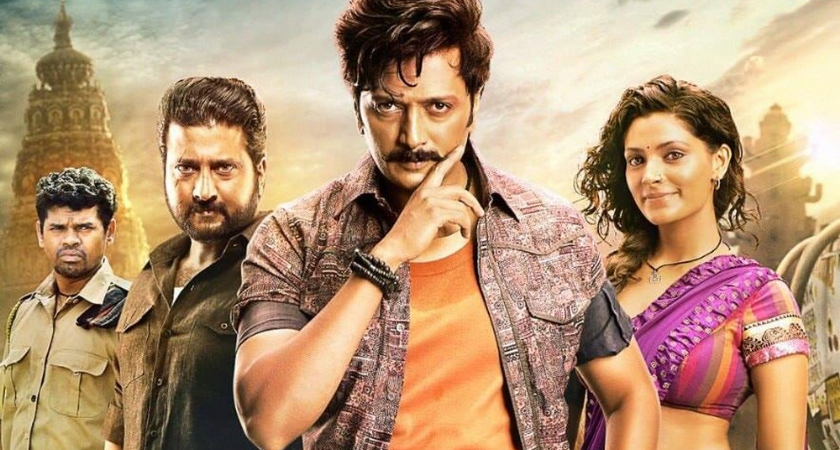
Now, Riteish Deshmukh has attempted one more such formula film packed with action and entertainment in the form of ‘Mauli’. Since this is not a sequel of ‘Lai Bhari‘ you can call this ‘Mauli‘ a distant cousin of Mauli of ‘Lai Bhari‘. This new Mauli ( Riteish Deshmukh) also has his past filled with lot of emotion filled happenings during his childhood, shown in flashback with some scenes picturised on his mother in distress played by actress Girija Oak. That’s how we get introduced to film’s protagonist Mauli a Police Inspector with 6 years of service and having seen 3 transfers. After landing as in charge of a small village in Maharashtra, he comes across a toughest mafia of land, distillery and water tankers- Nana Londhe ( Jitendra Joshi) whose men beat him up during their first meeting. But, soon we find a lot of change within him, with the encouragement received from his lady love from the village Renuka ( Saiyami kher) and a tea vendor Siddharth Jadhav. Time comes when he takes on all those gang members of Nana one by one to establish himself as the new hero of the village.
This is a limited story, but director Aditya Sarpotdar known for his successful films like ‘Classmates‘ and ‘Faster Fene‘ has tried his best to present a formula based action film well suited to his hero Riteish who has tried to offer some variety through his performance . ‘Mauli‘ is totally male dominated film with more fight scenes filled with violence, leaving less time for director Aditya Sarpotdar. Same is the case with lead actress Saiyami Kher, finds limited scenes to display her acting skills. She is however given some importance in the climax. She seems to be a perfect choice for that role. Siddharth Jadhav also finds restricted scenes though he tries to bring in some humour into this film. Among the character artistes Shrikant Yadav, Usha Naik & Girija Oak find some scope to display their skills. Genelia D’souza makes guest appearance in a ‘Holi‘ song as expected, but this time Riteish has not invited any Bollywood stars in guest appearance.
Technically it is a well made film, with good cinematography by Amalendu Choudhary . Drone cameras have been used very well to capture aerial photography. Special effects are almost on par with any big budget Bollywood film. Ajay Atul’s music is good but not as impressive as his previous hit films. Repeated slow motion scenes, predictable happenings (except for one twist before interval), are the few drawbacks of this film. If you keep your logical thinking aside, especially while watching those fight scenes, ‘Mauli‘ offers entertainment filled with lot of action for 2 hours 16 mins.
‘MPM 3′ mixes more emotions with humour
In ‘Mumbai Pune Mumbai‘ ( MPM) we saw the happening of love between Gautam and Gauri. In the second part we were introduced to their family members and misunderstandings between the lead pair but, finally we saw both of them agreeable for their marriage. Now, in ‘Mumbai Pune Mumbai-3′ (MPM -3) we find the happily married couple completing 3 years of their married life. Time comes when Gauri comes to know that she is pregnant, in spite of taking precautions. At this stage, both are not ready to become parents, due to their busy work schedule. Gautam feels that the right time would be after two years.

As the news about Gauri’s pregnancy spreads among their parents and relatives and we see the seniors in a happy mood. Finally, Gauri takes a decision to make all of them happy. And we notice all those traditional rituals observed to treat a pregnant woman in Maharashtrian families after which Gauri moves to her mother’s place, With few surprises and emotion filled happenings taking place, we find ‘all is well’ in the end, with enough material for Part 4 of this film.
‘MPM-3‘ focuses more on the busy lifestyle of the working couples today and the problems they face, when it is time for pregnancy of the woman. However, very cleverly the film shows the strong bonding of the young couple with their parents and elder members of the family, in spite of the existing generation gap. Enough scope is offered to every senior artiste in supporting cast and hence we get the feeling that it is the story of a working couple living next door.
Undoubtedly, the chemistry between Swwapnil and Mukta works very well and therefore both of them are at their best in this film too. They find good support from Mangal Kenkre, Prashant Damle, Suhas Joshi, Savita Prabhune, Vijay kenkre and others. Rohini Hattangadi who plays a close relative cum Gynecologist also impresses with her performance. What is remarkable is the use of speaking emojis reacting to every important situation in the film. The dialogues are more sensible and humour filled in the first half and so is the screenplay . But, in the second half it has been overstretched little before the climax, which is the only drawback of this film. Music and background music is just fine. Cinematography is good. Technically, it is a well made film. All in all ‘MPM-3‘ is a good family film.
‘Madhuri’ presents emotion filled bond between Mother and daughter
Now days, our Marathi films have been presenting new scripts offering variety to film lovers. And the latest released film ‘Madhuri‘ falls in this category. Set on the backdrop of picturesque Panchgani in Satara district, ‘Madhuri‘ presents an emotion filled bond between middle aged mother and her daughter, who has attained adulthood. So, it is the generation gap clearly noticed in the initial part of the film, between Single Mother Madhuri( Sonali Kulkarni) who is a College Professor and her happy go lucky daughter Kavya ( Sanhita Joshi) .

When the differences between mother and daughter attain a particular level, we find a particular happening , which takes Madhuri into Coma. After being operated, she survives, but suffers Retrograde amnesia and this brings Kavya closer to her mother and she does exactly what the treating psychiatrist ( Sharad Kelkar) advises her to do. Kavya’s boy friend Amar( Virajas Kulkarni) who is possessive about Kavya finds her drifting away from him. At this crucial stage we find another youngster Rohan ( Akshay Kelkar) who happens to be student of Madhuri, coming closer to mother and daughter, while treating her to recover completely.
Director Swapna Waghmare Joshi has paid more attention on emotions of the mother and daughter while handling this sensible subject. Through the characters of Shard Kelkar and Akshay Kelkar, she has brought the required humour into the screenplay. At the same time, the film has delivered a very good social message effectively, in the concluding part.
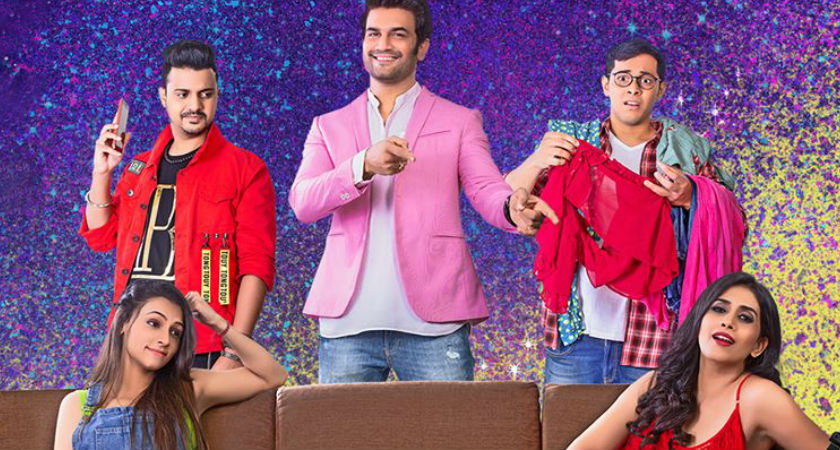
After ‘Kachcha Limbu‘ and ‘Gulabjam‘ , Sonali Kulkarni has found another good film to display her potential and she has played the title role wonderfully. But, the real star of the film is Sanhita Joshi who grabs all the attention with her fabulous performance. Sanhita has got an opportunity to exhibit different shades of her character through the role of Kavya. And, she has lived up to the expectations of not only her mother but also the audience. Sanhita certainly deserves an award for her performance in this film. Sharad Kelkar who plays the bridge between the mother and daughter offers excellent support, while good support also comes from Akshay Kelkar and Virajas Kulkarni. The film does surprise the audience with the presence of two actors in special appearance.
Music has very less scope in this film, but the background music is good. Cinematography is excellent and the costume designing of all the characters is also impressive. All in all, ‘Madhuri‘ is certainly a worth watch film for the entire family. Thanks to Urmila Matondkar for presenting a Marathi film on a sensible subject.
